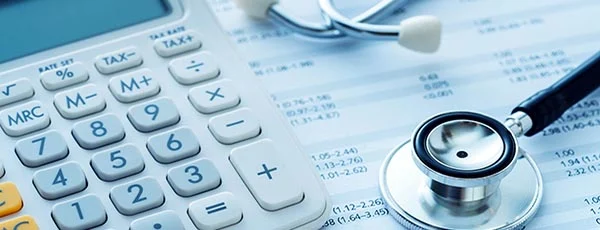
Get rid of your debt faster with debt relief
Choose your debt amount
Or speak to a debt consultant 844-731-0836
- Hospital bills can be costly even if you have medical insurance.
- It’s important to review hospital bills for errors.
- You may be able to negotiate a bill reduction or payment plan.
- Start your FREE debt assessment
Table of Contents
Paying hospital bills can strain your budget, especially if your insurance doesn't cover everything or you're uninsured. But paying cash for doctor visits is unrealistic for many people.
According to the Census Bureau, 19% of American households can't afford to pay for medical care upfront. If you're worried about medical debt putting a drain on your finances, it helps to know the best ways to manage it.
Why Are Hospital Bills so Expensive?
Getting sick or injured can come with a high price tag in the U.S. According to HealthCare.gov, a three-day hospital stay can get you a $30,000 bill. Treatment for severe illnesses like cancer often costs hundreds of thousands of dollars.
So why are hospital bills so expensive? The answer depends on who you ask.
According to BlueCross BlueShield, three main factors are driving high health care costs:
- Increasing costs for prescription drugs
- Rises in chronic illnesses
- Unhealthy lifestyles that contribute to chronic conditions
David Cutler, professor in the Department of Global Health and Population at Harvard T.H. Chan School of Public Health, proposes that high health care costs in the U.S. result from other factors. Specifically, Cutler chalks it up to administrative expenses, corporate greed, price gouging and increased utilization of expensive medical technology.
Regardless of why hospital bills are so expensive, the fact is that health care is unaffordable for many people. That can be challenging if you have hospital bills to pay.
What Happens if You Don't Pay Hospital Bills?
If you don't pay hospital bills, they won't just go away. Instead, your health care provider will reach out to you to arrange payment. Meanwhile, late fees and other charges may increase the balance.
Your health care provider may send your past due hospital bills to collections. You may then get calls or letters from a debt collection agency requesting payment.
If you still don't pay, the debt collector may file a lawsuit against you. Should the court rule in favor of the debt collector, your credit score will probably suffer. Judgments and late payments can be highly damaging to your credit scores.
Once a judgment is entered, the debt collector can take the additional step of getting a court order to force you to pay. Depending on what your state laws allow, this can include garnishing your wages or attaching your bank accounts.
So what happens if you don't pay hospital bills? In short, nothing good. But there are things you can do to cope with medical debt to avoid a worst-case scenario.
How to Save Money on Hospital Bills
If you have health insurance, your insurance company will probably pay at least part of your medical bills. Be careful to preauthorize your treatment when required and to choose providers covered by your plan.
Even if you have insurance, it's still important to look for opportunities to reduce hospital bills and save money.
Start by reviewing your bills for accuracy. If your health care provider hasn't given you a detailed itemized statement of your charges, ask for one. Then go through that statement line by line to make sure that the charges are correct.
Specifically, look for things like:
- Dates care was received
- Costs for tests or screenings you received
- Duplicate charges
- Figures that appear to be too low or too high
- Charges for services that you did not receive
Your insurance company may also send you an Explanation of Benefits (EOB). This document isn't a bill; instead, this document explains:
- What your insurance covers
- Deductibles or coinsurance that you have to pay
- Payments for health care bills made on your behalf
If there's something on your hospital bill or EOB that you don't understand or appears to be inaccurate, ask for clarity. Contact your health care provider and the insurance company to ensure that you're being charged fairly and accurately for health care. If you've been overcharged, request that amounts be corrected and a new bill issued.
Also, ask if any discounts are available to help with the costs of care your insurance doesn't cover. For example, your health care providers might be willing to offer a discount if you enroll in a payment plan and sign up for automatic payments or make a lump sum payment toward the amount due.
How to Pay Hospital Bills Without Insurance
According to the Census Bureau, an estimated 28 million people don't have health insurance. If you're one of them, it's essential to know how to pay hospital bills without insurance to avoid the possibility of those debts landing in collections.
If you've reviewed your medical bills and you're sure they're accurate, you can move on to the next step and attempt to negotiate a self-pay discount or reduction of the bill. Health care providers may be willing to reduce charges for uninsured patients if it increases their odds of receiving payment.
Here's a tip for how to get medical bills reduced: use the Healthcare Blue Book to look up average charges for the kinds of care you received. Then use those amounts as a starting point for attempting to talk down the amount owed.
You might consider applying for Medicaid or Medicare to get help with medical bills. Medicaid offers assistance to low-income individuals and families, while Medicare is designed for Americans aged 65 and older. Eligibility for Medicaid is based on income, financial resources and family size, while Medicare eligibility is determined by age and disability status.
If you can't pay hospital bills because of financial hardship, see if the hospital offers a charity care program. Charity care programs provide financial relief to patients who cannot pay their medical bills but don't qualify for government aid, like Medicare or Medicaid.
Using a Credit Card or Loan to Pay Hospital Bills
When you don't have the cash to pay medical bills, you might consider using a credit card or loan to pay instead. While these options are convenient, there are some pros and cons.
Using a credit card to pay can keep your account from going into collections. But if your card carries a high APR, that could make the medical debt more expensive.
Charging a large amount of medical debt to credit cards also increases your credit utilization ratio. This ratio represents how much of your credit limit you're using. Increasing this ratio causes your credit score to drop. You can offset this by either requesting an increase to your existing lines of credit or by applying for a new card for your medical debt.
If you apply for a credit card to pay hospital bills, it helps to choose the right card. Look for:
- A low 0% introductory APR for purchases
- No annual fee
- Rewards for purchases
Earning some cashback, for example, could help take the sting out of high medical bills if you're able to apply those rewards to your balance as a statement credit. But it's essential to have a plan for paying off the balance as soon as possible, so your medical debt doesn't stick around long-term.
You could use a personal loan in place of a credit card to manage hospital bills. Personal loans don't offer rewards, but you could get a lower APR if you have a good credit score. With a personal loan, your payments are structured over a set period. That can make it easier to budget your debt payoff if you think you'll need more than a few months to clear the balance.
Comparing personal loan lenders can help you find the right loan with the best terms. Aside from the interest rate, consider any fees that may apply, such as origination fees or prepayment penalties.
If you've tried all other methods for managing hospital bills and still need help, debt settlement might be an option. When you settle debts, your billers agree to accept less than what's owed to clear the account. Working with a reputable debt settlement company could help you avoid further collection actions for unpaid medical bills.

Get rid of your debt faster with debt relief
Take the first step towards a debt-free life with personalized debt reduction strategies.
Choose your debt amount
Or speak to a debt consultant 844-731-0836
How can I get my medical bills reduced?
You may be able to lower medical bills by asking for a discount from the health care provider or negotiating a lower bill amount. Reviewing your hospital bills for errors or duplicate billing can also help you save money if you can get the charges corrected.
How can I pay hospital bills without insurance?
If you don't have insurance, your options for paying hospital bills might include establishing a payment plan, taking out a personal loan or using a credit card to pay. When comparing different options for paying hospital bills without insurance, consider the long-term cost if you're paying interest and how payments fit into your budget.
How do hospital bills affect credit scores?
Failing to pay medical bills could lead to collection actions. Debt collectors may call you or mail you letters with requests to pay. They could also seek a judgment against you. Medical bills in collections and judgments related to medical debt could damage your credit scores.
Recommended Reads







